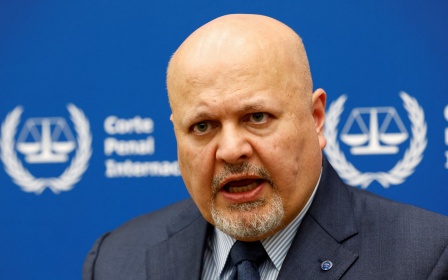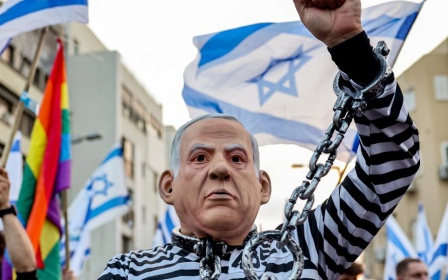ICC arrest warrants: The Palestinians have prevailed in the 'legitimacy war'

The International Criminal Court (ICC) delayed the formal issuance of arrest warrants for top Israeli political leaders directing the genocidal assault on Gaza for six months, although it responded affirmatively to a comparable request involving Russian President Vladimir Putin's alleged criminality in Ukraine.
Double standards, to be sure, yet ICC action is a welcome alternative to either denying chief prosecutor Karim Khan's recommendation of 20 May or delaying indefinitely the decision on whether the arrest warrants should be issued.
The ruling of ICC Pre-Trial Chamber 1 to issue arrest warrants for Israeli Prime Minister Benjamin Netanyahu and the former Minister of Defence Yoav Gallant, given the overwhelming evidence of their responsibility for severe international crimes, comes as big news.
It is a blow against geopolitical impunity and in favour of accountability.
New MEE newsletter: Jerusalem Dispatch
Sign up to get the latest insights and analysis on Israel-Palestine, alongside Turkey Unpacked and other MEE newsletters
If this ICC action is assessed by its ability to sway Israel's short-term behaviour in directions more in accord with international law, as well as to the majority views prevalent in the UN, the Global South, and world public opinion, this ICC decision can be cynically dismissed as an empty gesture.
Some argue that the tangible impact of arrest warrants, if any, will be to alter Netanyahu and Gallant's future travel plans slightly. The decision obliges the 124 member states of the ICC to carry out arrests of these individuals, should they be so bold as to venture onto their territory. Non-parties, including the US, Russia, China, Israel, and others, are not even subject to this trivial obligation.
Limitations
We should remember that Palestine is a party to the ICC treaty.
Thus, if either Netanyahu or Gallant were to set foot in the occupied Palestinian territories of Gaza, the West Bank, and East Jerusalem, the governmental authority in Ramallah would be legally obliged to make arrests.
The delay in issuing the arrest warrants is inexcusable in view of the dire emergency conditions of devastation, famine, and suffering existing in Gaza
Yet it would test the bravery of the Palestinian Authority far beyond its past behaviour if it dared to arrest an Israeli leader, however strong the evidence against him. This assessment of tangible effect misses the point of why this is a historically significant development both for the Palestinian struggle and the credibility of the ICC.
Before putting forth an argument as to why this ICC move is a historic step, it seems responsible to acknowledge its important limitations:
First and foremost, although the prosecutor's recommendation to the Sub-Chamber of the ICC was made in May (or eight months after 7 October 2023), it did not include "genocide" among the crimes attributed to these two leaders, which is, of course, the core criminality of the Israeli onslaught, as well as expressive of their role.
Also, a notable limitation is the long ICC delay between the recommending arrest warrants and the Sub-Chamber ruling.
This was substantively inexcusable in view of the dire emergency conditions of devastation, famine, and suffering existing in Gaza during this interval and aggravated by Israel's obstruction of humanitarian assistance provided by Unrwa and other international aid and humanitarian organisations to the Gazan civilian population in desperate need of food, fuel, electricity, potable water, medical supplies, and health workers.
The ICC decision is further subject to jurisdictional challenge once the arrest order has been finalised. The 20 November acceptance of jurisdiction is, in a formal sense, provisional, as Israel's objection to ICC jurisdictional authority was made prematurely but can be made without prejudice in the future now that the ICC has acted.
Even in the unlikely event that arrests could be made, it is doubtful that detention could be implemented, given the US Congressional legislation authorising the use of force to "liberate" from ICC captivity accused US nationals or allies.
There have been already intimations that some US Senate and House members will enact sanctions against Khan and the members of the ICC Pre-Trial Chamber. Such initiatives, if enacted, will further weaken the US reputation as a supporter of the rule of law in international affairs.
Lasting significance
Despite these formidable limitations, this invocation of the procedural authority of the ICC is itself a grim reminder to the world that accountability for international crimes should pertain to all governments and that the evidence has been assessed by objective and professionally qualified experts under the auspices of an international institution that is empowered by a widely ratified treaty to determine the legal appropriateness of making such a controversial decision.
The ICC's official rulings are rendered without being subject to a right of veto that has paralysed the UN Security Council throughout this period of Gaza violence.
This does not mean that implementation will follow or that prosecution will go forward, much less that future findings of guilt will be respected in the unlikely event that they occur, as the older ICJ has found out, to its dismay, since its establishment in 1945.
Follow Middle East Eye's live coverage of the Israel-Palestine war
However, both the ICC and ICJ are formally free from "the primacy of geopolitics" that so often overrides the relevance of international law or the UN Charter in other non-judicial venues.
An outcome of the sort that the ICC reached regarding the arrest warrants is a direct and authoritative application of international law, and in that sense, produces not counter-arguments but crude denunciations. Netanyahu calls the ICC ruling "absurd" and a manifestation of "antisemitism". This kind of verbal Israeli lashing of the UN itself and its activities has led to such denunciations in the past.
The lasting significance of the issuance of the arrest warrants is to help Palestine win the "legitimacy war" being waged to control the high ground of law, morality, and public discourse.
Political realists that continue to dominate foreign policy elites in important states dismiss international law and normative considerations in global security and geopolitically inflamed settings as a misleading distraction to interactions that are best guided and, in any event, will be determined by the interplay of military force.
Such thinking overlooks the experience of all anti-colonial wars in the prior century that were militarily won by the weaker side. The US should have learned this lesson in the Vietnam War, where it dominated air, sea, and land battlefields and yet lost the war.
The weaker side militarily prevailed, that is, it prevailed in the legitimacy war, which more often than not has controlled political outcomes since 1945 in internal conflicts of national identity. These outcomes reflect the decline in the historical agency of militarism, even in the face of many seemingly breakthrough technological innovations in warfare.
For this reason, yet mainly without this line of analysis, more and more close observers have come to the surprising conclusion that Israel has already lost the war and, in the process, endangered its future security and prosperity, and possibly even its existence.
In the end, Palestinian resistance may achieve victory despite paying an unspeakable price exacted by such a horrifying genocidal assault.
If this outcome comes to pass, one of the international factors that will be given attention is the ICC's decision to issue arrest warrants against Netanyahu and Gallant, however futile such action seems today.
The views expressed in this article belong to the author and do not necessarily reflect the editorial policy of Middle East Eye.
Middle East Eye delivers independent and unrivalled coverage and analysis of the Middle East, North Africa and beyond. To learn more about republishing this content and the associated fees, please fill out this form. More about MEE can be found here.






